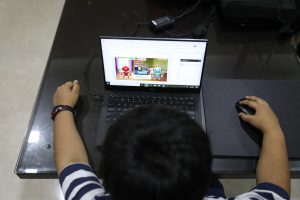Covid-19 can widen gaps in children’s development
May 26, 2020

Singapore, along with the rest of the world, has undergone significant upheaval during the health crisis of Covid-19. Every sector of society has experienced a break in their usual routine, and it remains to be seen what the long-term effects will be on the new way that we live our lives. Professor Wei-Jun Jean Yeung (NUS Department of Sociology & Centre for Family and Population Research (CFPR)) discusses the unprecedented disruption to the educational development and outcomes for children in Singapore during the pandemic of 2020 in ‘Covid-19 can widen gaps in children’s development’ (The Straits Times, 2020).
Among the survey group in the Singapore Longitudinal Early Development Study (SG LEADS), conducted by CFPR, the majority of lower income families lived in one-to two-room HDB units and prior to the crisis were already living without a financial safety net. Regular money saving strategies for parents often involved buying less food, which resulted in the disturbing fact that one in seven (14.5%) parents reported that their children did not have enough food as they could not afford it. Amidst the financial uncertainty brought on by the health crisis, young children are being confronted with missed meals, claustrophobic environments, and new unfamiliar ways of learning outside of the classroom experience.
With the shift to online learning platforms Prof Yeung articulates the growing digital gap that has emerged between the haves and have-nots of Singapore. 8% of children in the survey did not have access to Wi-Fi at home and a further 44% did not have access to a computer or laptop at all. Furthermore, those that did often had to share the devices with siblings and parents which resulted in reduced efficiency in learning.
The text highlights the sobering consequences of an unconducive home learning environment and a lack of access to computers and tablets in the sharp disparity of academic achievements. In both word recognition and mathematics problems, over 50% of children who lived in condos or landed properties ranked in the 74th percentile or higher, whereas over 50% who lived in rental units ranked lower than the 35th percentile.
The so-called ‘circuit breaker’, or partial lockdown, implemented by the Singapore Government has further heightened the learning gap due to what Prof Yeung terms the early ‘summer learning gap effect’. This is a situation whereby wealthier parents can use their resources and networks to mitigate any lost school hours through private tuition and other academic experiences.
Prof Yeung urges increased and sustained assistance for poorer children through the provision of free food, books, and other educational resources in order to narrow the attainment gap that has only widened further due to Covid-19.
Read the full article here.
